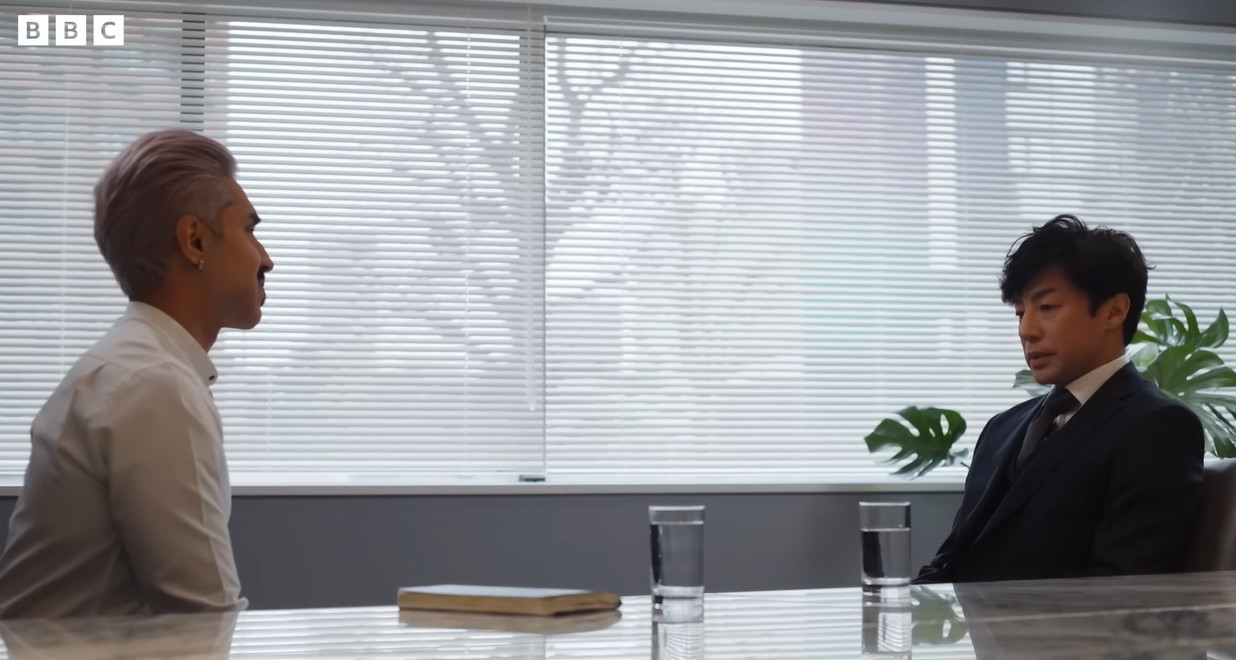Around a couple of weeks ago, the BBC previewed their follow-up documentary to their original that finally managed to topple at least the legacy of Johnny Kitagawa through shining a light on his massive sexual abuse scandal. They recently released The Shadow Of A Predator as a follow-up, again with reporter Mobeen Azhar, and this time with SMILE-UP‘s Higashiyama Noriyuki also involved, and a part of that follow-up is the extended interview with Higashiyama.
I don’t expect much from Japanese companies and/or executives when it comes to dealing with moral issues like this, but he certainly doesn’t help himself or SMILE-UP here.
The question of whether Higashiyama has any formal background in social work or counseling, and whether he was the best person to handle all of these issues was perfect, because Higashiyama later showed he definitely did not by being unable to simply disavow online abuse of survivors (citing freedom of speech) and being unable to answer concerns that the company is a part of contributing to the narrative that those coming forward are lying (thus giving further leeway for harassment of other victims). The reveal that they had Azhar sit in with victims who said there were other victims lying prior to the interview was something I wasn’t expecting.
Like that’s impressively bad, especially when known victims are out there basically begging people to not harass them.
— Transitions
JK
Hashida Yasushi, one of the survivors who spoke up about Johnny Kitagawa's sexual abuse, posted a plea for netizens to stop their online abuse.
"… please do not vent those emotions on us with your words, but consider how we are actual humans too." pic.twitter.com/NiVHVbrejFWe 40! (@transitions0101) March 30, 2024
Anyway, I thought Azhar did a great job of pressing Higashiyama on how they determine somebody who comes forward is lying, how not working at the company could be irrelevant to them telling the truth due to Johnny’s extensive scouting, what exactly they’re doing to encourage victims to come forward, what they’re doing to prevent it from happening again, and whether Julie Fujishima still has a role and/or profits from the company.
Additionally, things like asking about the timeline of knowledge of Johnny’s abuses was interesting, as Higashiyama had an extremely difficult time answering the question of “Why don’t you think those conversations weren’t happening?” in reference to the lack of internal reckoning when Johnny was still alive, either after the allegations first surfaced or when he lost the court case to Shukan Bunshun.
While I’m glad Higashiyama agreed to the interview, if the intent was to clear the air, put the public at ease that things were being done correctly, and perhaps lessen international scrutiny, then it failed miserably, because the mixed messaging gave me the impression that the primary goal is still just for the whole process to happen in silence with as little scrutiny as possible and that they’re hoping they can move on quickly.
——
Unfortunately, I have not been able to watch the actual follow-up documentary thus far*, but based on the reactions so far it seems like somewhat of a summary of everything that has transpired since. However, it did reveal that two others were involved in the sexual abuse, and while SMILE-UP say it was mentioned in the report back in August, many (including me) were not aware. Additionally, the extent of their punishment was apparently a reprimand.
*Let me know if you know where I can watch it.
Smile-Up said the fact that other employees were involved in sexually abusing performers had already been included in an August report compiled by a third-party panel, and that it has shared information on what it knows about the two individuals with the investigation team.
Smile-Up had already reprimanded the two last September in compliance with relevant legislation and company regulations, it said, though it declined to provide additional details on the two to protect the privacy of those involved.
To be fair, I do agree that it’s difficult for SMILE-UP to go forward legally without the consent of victims. Because yes, the company can hypothetically back them, but unless the victims are willing to give testimony, any legal case is likely to go nowhere. That said, given the interview, it’s hard to believe the company is exactly doing everything in their power to help out.
 Asian Junkie Asian pop. Without discretion.
Asian Junkie Asian pop. Without discretion.

